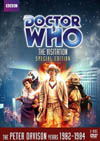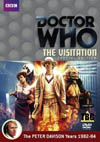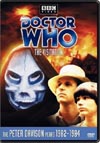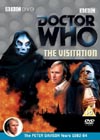Original DVD Extras include:
Special Edition DVD Features add:
FIRST IMPRESSIONS:The opening of this story is terrific. A quaint musical cue by Paddy Kingsland helps establish the olde English setting, while the special effects team delivers several enjoyable spectacles, including some of the best lasers we've ever witnessed on Doctor Who, and we're into the story's first action beat before you know it. The members of the local family we see are four interesting characters who are very well portrayed and introduced, and their discussions and solid efforts to deal with things beyond their experience are highly worthy of our attention. At this point, on my first viewing as a teenager, I was thinking to myself that Eric Saward was the best writer I'd ever remembered seeing on Doctor Who (the others having been Robert Holmes, Douglas Adams, and David Fisher, whose names I couldn't remember, and Chris Bidmead, Terence Dudley, and Chris Bailey, whose credits I'd recently caught on videotape).However, the remainder of episode one is rather quiet and at many times pretty aimless. Our four regulars are introduced at a leisurely pace which works, although the TARDIS gets less than the ideal intro.
PlotI will be somewhat brief here, reserving my more detailed discussion of the plot with its potential spoilers in the In-Depth Analysis version of this review. Part One attempts to sustain itself primarily with exploration and investigation. It isn't as successful as many previous stories such as Terry Nation or Robert Holmes might write, and one major cause may be the fact that our protagonists don't really uncover anything significant that the audience didn't already gather from the opening sequence.Part One ends with one of the most non-existent cliffhangers ever produced on the show, leaving a very anti-climactic aftertaste with viewers for a week. Little can they suspect how much more fascinating Part Two becomes the instant it goes past the cliffhanger moment. The investigation continues, now suddenly full of new information that the audience didn't already get from Part One's opening sequence, and each revelation being accompanied by enjoyable visual effects to boot. All this leads up to and through an excellent action beat, followed by some of the best parts of the story, earning it many positive points. Things begin to drag again though near the end of the episode and well into the next one, a section of the story that fails to become infused with any interesting level of character interaction, be it in dialogue or action. The story must lose some points for this lack of imagination. The writer and producer also wanted to curb the near-magical overuse of the sonic screwdriver, which was a noble goal, but they end up going too far with this idea. If the end result is only going to stretch out dull challenges like opening locked doors to escape the prisoner dynamic, we'd be better off letting the sonic screwdriver get on with it to quickly skip past such boring, "filler" story beats. Being resourceful in opening locks with everyday objects can easily end up setting bad examples for youngsters that they can actually follow. As I've often advocated, have the endearing gadgets of the series like K9 and the sonic screwdriver, but limit their abilities so they don't become magical solutions to all problems, and the Doctor can still demonstrate incredible resourcefulness with everyday objects. That balance is your best course.
CharactersThe roster of guest characters is rather unusual, wandering off-format in a way that doesn't work particularly well. The four excellent characters from the opening of the story are nowhere to be found during the remainder of the tale. Most of the rest of the locals that we meet are bland, very easily forgettable, and lack any kind of motivation that most audiences would care to sympathize with. Attempts at dialogue often feel artificially reduced to moronic levels or are cut off completely to facilitate later attempts at action which the writer is obviously more interested in. The resulting characters are left without an ability to resonate with the audience.The one obvious exception to this is the character of Richard Mace, who is in a sense over-dramatized as much as all the others are under-dramatized. It is helpful to understand that Mace was already an established success in several of Saward's radio plays, and that "The Visitation" was Saward's first television script, thus Mace thrives on his own rich, flowery dialogue far more than any natural character would. Michael Robbins, whom I'd previously enjoyed enormously from the sitcom "On the Buses", brings the role to life in a very enjoyable fashion anyway. With the production order recording this as Peter Davison's second story, it seems he is only just settling in from the general character he previously played in "Four to Doomsday" (story no. 118), and finding his own Doctor from here on. He excellently carves out the manner of interaction he will enjoy both with his companions and with the adversaries that he encounters. Where his Doctor still seems rough around the edges are in his encounters with the bland local characters, and opposite Richard Mace the delivery of his lines sometimes can't resist being pulled over the top and sounding a bit silly. The Terileptil is perhaps the best character Saward has created for the story, but it is interesting to note that it works primarily due to the dialogue and strong vocal qualities that Michael Melia is able to bring to the role - things which naturally work well on radio. The visuals and limited animatronics of the Terileptil are okay, particularly for a minor character with little dialogue, but for the main adversary it is a bit disappointing. Despite some very strong scenes between the Doctor and the Terileptil in Part Three, the image of the "talking fish" does not help the story earn positive points. Interestingly, many of the Terileptil's speeches feature shots of only his hands, or his listeners, a technique which was thankfully helpful in keeping the believability level from falling too far. Despite arriving in this adventure with three companions, the Doctor gradually loses them all to their own varying adventures until Richard Mace becomes his sole companion by default. Mace does an enjoyable job of fulfilling the typical functions of the role. Adric has often been labeled the least useful companion, and even "the idiot", but I don't think he ever really fitted that description until Saward wrote for him in this story. He is certainly off to a bad start in Part One, yet still manages to aid the others in various ways and play a vital part in the story's conclusion. By comparison, Tegan has far fewer critical things to do, and is less interesting for it in the end. Nyssa lucks out in getting a really important and heroic role in this story, using her inventiveness and seeing some of the most significant action of the story's conclusion. Excellent.
FinalePart Four delivers some really great stuff as it proceeds steadily through its concluding action. However, it all leads up to a somewhat anti-climactic confrontation with the chief adversaries themselves. The result is both morbid and disappointing, and Davison's character seems quite out of place in the midst of it.Davison's Doctor often exudes a sense of calm spirituality during an adventure, a trait which is perhaps his best, yet many remember him as a violent Doctor, which stems more from the conclusions of each adventure than anything else, and feels like a butchering of his character each time it occurs. There is a quote from Eric Saward in the documentary "More Than 30 Years in the TARDIS" which I believe holds the key to why he seemed to have so much trouble writing and/or controlling appropriate concluding action for Peter Davison's Doctor. Saward says:
The Doctor is involved in adventures with violent people,
and sometimes the only way you can deal with violence
is to become violent yourself.
To me, this is a clear revelation of both lack of imagination and,
again, a lack of recognition of the social consequence to violence that
makes violence unviable as an actual solution to problems.
And of all the Doctors, Peter's seems to me to be the least suited to using
the violent solution. Yet time and again, Saward can think of nothing
else to give him, if indeed he really ever wanted to search for something.
I often wonder if he was frustrated with the specific Doctor he inherited,
and in particular the character brief that came along with him. While both
Davison's Doctor and Saward's writing instinct have many, many qualities
to recommend them, I often wonder if they were a good match for each other,
and I'd be keen to see what Davison might have done under a different
script editor.
Paddy Kingsland produces a thoroughly enjoyable score for this story, with highlights including the exploration of the pod, part two's encounter with the android, and the theme for Nyssa's industrious sequences, in addition to the very memorable opening sequence. The final ending is not as brilliant as some would say. On first viewing as a teen, the story had failed to set up its significance properly for me. I had to go and ask someone to have it explained, and by then it had lost all its impact.
This story has become available on DVD and VHS video.
Comments on this article are welcome. You may contact the author from this page:
|
|||||||||||||||||||||||||||||||||||||||||||||||










